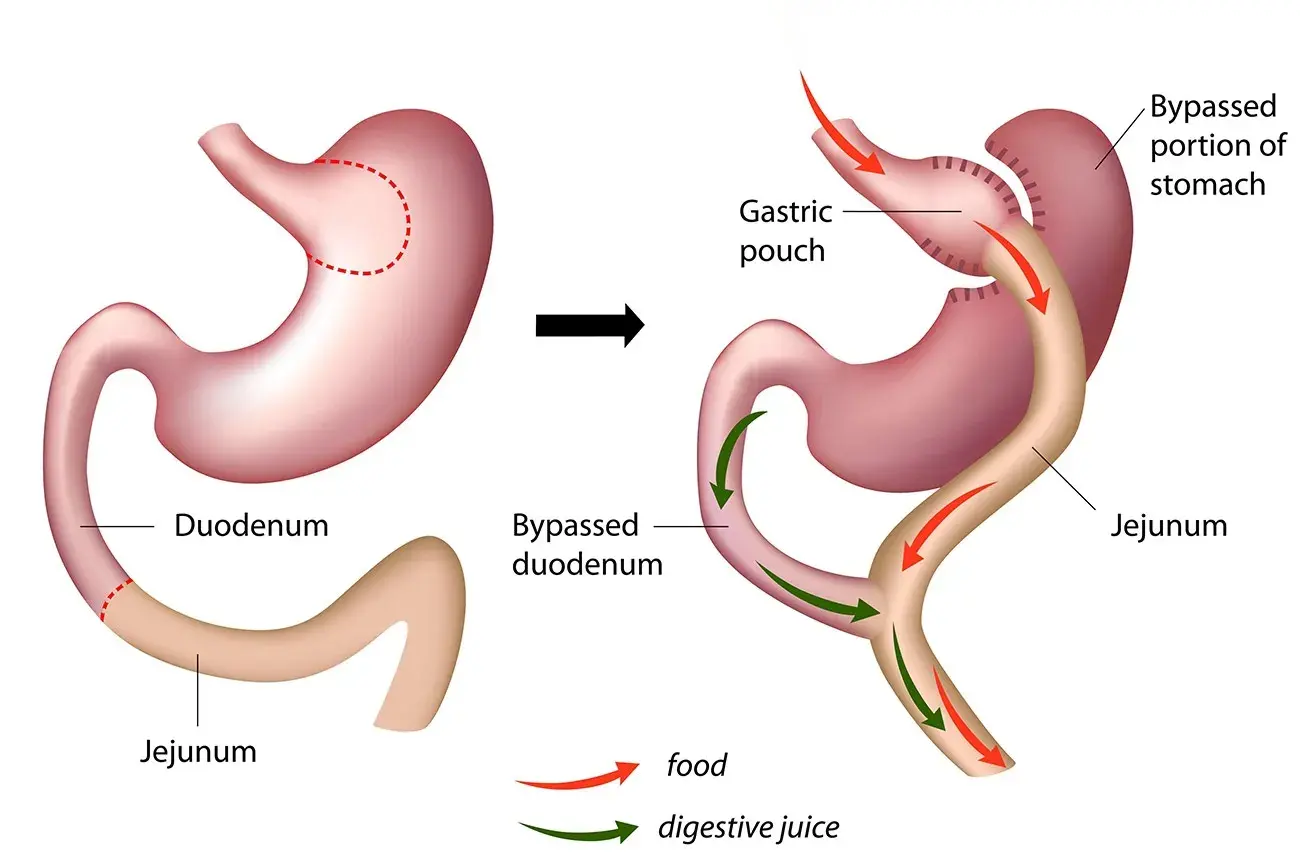
Gastric Bypass
What Is Gastric Bypass Surgery?
Gastric bypass is a surgical procedure in bariatric surgery designed to reduce stomach size and limit nutrient absorption by bypassing a portion of the small intestine. During the procedure, the stomach is reshaped into a pouch approximately 30-50 cc in size, which is then connected directly to a specific section of the small intestine. This results in reduced food intake and decreased calorie absorption, promoting significant weight loss. Gastric bypass is primarily performed for sustained weight loss and is particularly effective for individuals with morbid obesity, aiding in long-term weight management.
When Is Gastric Bypass Surgery Recommended?
Gastric bypass is primarily recommended for the treatment of morbid obesity and related health conditions. It is particularly beneficial for individuals suffering from type 2 diabetes, hypertension, sleep apnea, and other obesity-related metabolic disorders. Studies have shown that the procedure significantly improves the management of these conditions. Patients with type 2 diabetes who have not achieved satisfactory results through diet or medical treatments often experience positive outcomes with gastric bypass surgery.
How Is Gastric Bypass Surgery Performed?
Before the surgery, patients undergo comprehensive evaluations, including assessments by specialists in endocrinology and psychiatry, to determine their suitability for the procedure. Gastric bypass is typically performed laparoscopically, involving small incisions in the abdomen, which minimizes recovery time. During the surgery, a small stomach pouch is created, and a new connection to the small intestine is made. This bypasses a portion of the digestive tract, reducing calorie absorption and inducing a feeling of fullness with smaller food portions. In some cases, robotic surgical techniques may be utilized.
Post-Surgery Recovery and Follow-Up
After gastric bypass surgery, patients generally stay in the hospital for 4-6 days under medical observation. A diet plan tailored by a dietitian is provided before discharge. For the first year, patients are closely monitored by a multidisciplinary team, including endocrinologists, dietitians, and psychiatrists. Due to decreased nutrient absorption, vitamin and mineral supplementation is often required to prevent deficiencies. Patients are advised to adapt to smaller food portions and attend regular medical check-ups.
Types of Gastric Bypass Surgery
- Roux-en-Y Gastric Bypass: The most commonly performed type. The stomach is divided into a small pouch (25-30 cc), and a new connection between the stomach and small intestine is created, bypassing the majority of the stomach and the initial section of the small intestine. This significantly limits calorie intake.
- Mini Gastric Bypass: In this simpler variation, the stomach is reshaped into a tube-like structure, and the small intestine is connected at a point approximately 200 cm away. Calorie absorption is similarly reduced. Both methods yield comparable weight loss outcomes.
Risks Associated with Gastric Bypass Surgery
Like all major surgeries, gastric bypass carries potential risks. These include infection, bleeding, and blood clots during the procedure. Postoperative complications may involve nausea, dumping syndrome (rapid emptying of stomach contents into the small intestine), and bowel obstructions. A serious risk is the development of leaks at the connection between the stomach and small intestine, which may require additional surgical intervention. Additionally, pre-existing obesity-related conditions, such as embolism or heart problems, can increase surgical risks.
Who Is a Candidate for Gastric Bypass Surgery?
This procedure is typically recommended for individuals with a Body Mass Index (BMI) of 40 or higher or those with a BMI between 35-40 who have serious health issues such as diabetes, hypertension, or sleep apnea. A thorough preoperative health screening is crucial to ensure the suitability of the surgery for each patient, as not all cases qualify for this treatment option.
Contact Us for More Information on Gastric Bypass Surgery
For more details about gastric bypass and other bariatric surgery options, reach out to our expert team. Learn about the treatment options best suited to your needs and take the first step towards a healthier life!
